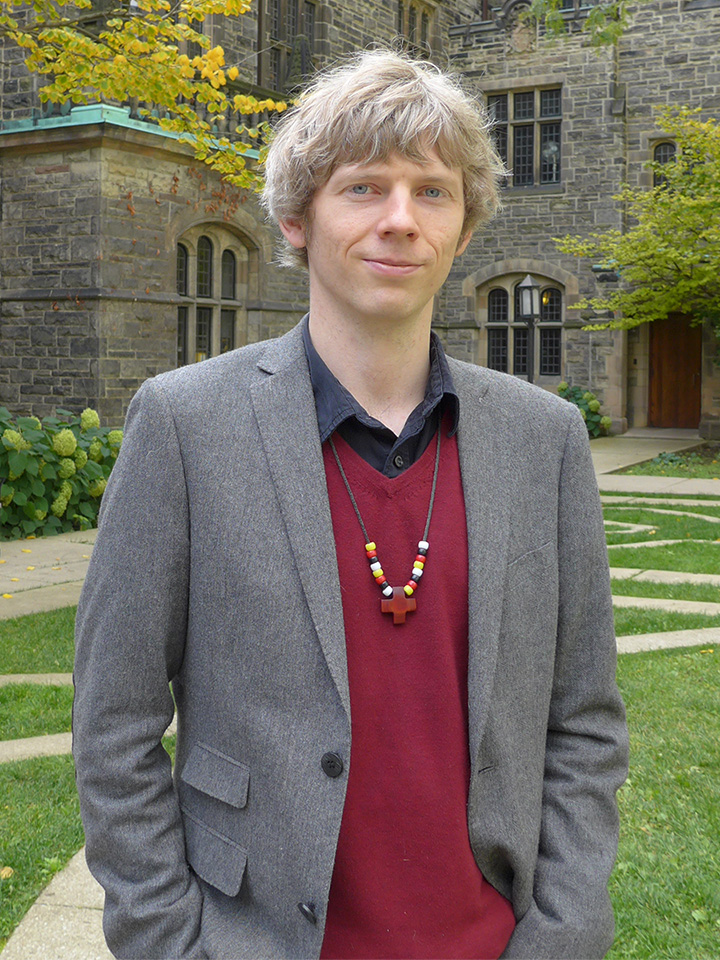Divinity Student Jeffrey Metcalfe Awarded Ontario Graduate Scholarship to Study the Culture of Empathy
First to apply theocritical ethnography research in Christian communities engaged in aiding refugees
“For years bodies had been accumulating on the shores of the Mediterranean Sea, as civil war and famine displaced millions from their homes. While church leaders called on their communities to respond to the crisis by sponsoring refugee families, most congregations came to the conclusion that doing so was beyond their capacity or purpose. This all changed on September 2, 2015, when a photographer captured the image of Alan Kurdi, a three-year-old Syrian boy, whose lifeless body washed up on the shores of Turkey. Suddenly churches that once had no interest in the refugee crisis, or had previously claimed a lack of capacity or vocation to welcome refugees, immediately began organizing committees and raising funds to sponsor families in the hope of preventing further human tragedies. This sudden shift in attitude and action cannot be attributed to the information about the global refugee crisis to which church members always had access. What changed on September 5, 2015, was their degree of empathy, evoked by the tragic photo of Alan Kurdi.” — Jeffrey Metcalfe
 The Rev’d Jeffrey Metcalfe is driven by work that has a meaningful impact on the community. After graduating from Trinity College with a Master of Divinity in 2011, Jeffrey spent the next three years in church ministry, as the Priest in Charge of three parishes in the Magdalen Islands and working for the Anglican Diocese of Quebec. Awarded an Ontario Graduate Scholarship (OGS) – a merit-based scholarship jointly funded by the Province of Ontario and the university awarding the scholarship – he returned to Trinity in September 2015 and began his PhD in theological studies with the Faculty of Divinity.
The Rev’d Jeffrey Metcalfe is driven by work that has a meaningful impact on the community. After graduating from Trinity College with a Master of Divinity in 2011, Jeffrey spent the next three years in church ministry, as the Priest in Charge of three parishes in the Magdalen Islands and working for the Anglican Diocese of Quebec. Awarded an Ontario Graduate Scholarship (OGS) – a merit-based scholarship jointly funded by the Province of Ontario and the university awarding the scholarship – he returned to Trinity in September 2015 and began his PhD in theological studies with the Faculty of Divinity.
“I feel very blessed to have won the Ontario Graduate Scholarship,” Jeffrey said. “The OGS and the Howard Buchner Junior Fellowship in Divinity I have with Trinity College are critical – without them I simply would not be able to return to school full-time to pursue my research.”
Jeffrey’s doctoral thesis “Apprenticing Love: A Theocritical Ethnography of Empathy in a Christian Community” will connect theory and practice. He will examine the culture of empathy in a Christian community who welcomes refugees in order to understand the cultural practices that create empathy and how to increase the capacity for empathy.
“With the Syrian refugee crisis, understanding the roots of empathy seems more critical now than ever – the humanitarian crisis has touched nearly every one of us in some way,” said Mayo Moran, Provost and Vice-Chancellor of Trinity College. “Jeffrey is an incredible student: his commitment to his work and compassion for the communities he serves will undoubtedly make a real difference in the lives of many people, especially the most vulnerable, and help us, as Canadians, to become more empathetic and welcoming.”
For his research, Jeffrey will look at an existing empathetic Christian culture within a community that engages in exemplary helping behaviour in order to identify how such a community comes into being and how such a culture in turn may affect, and may be affected by, its helping behaviour. He will be living and working with the community in order to map out their cultural practices: “To fully understand the intricate sets of day-to-day practices, how they relate to a Christian community’s story, and how they form empathetic, virtuous people, will require rigorous and disciplined participant observation in the daily life of that community.”
The goal of his research is to be able to implement practices and beliefs that promote helping behaviour toward refugees and to create places that are more likely to help other marginalized people. “I hope that we can implement these practices in other settings to the benefit of the wider civil society. If you increase empathy for one group, it often overflows to other groups,” he added.
As an interdisciplinary subfield of Christian ethics, Jeffrey explained that theocritical ethnography is still in its infancy. “This methodology is ‘theocritical’ in the sense that it is a reflexive ethnography that must be aware of – and take into account – the researcher’s own theological commitments, and how those commitments might interact and colour aspects of the observation and subsequent reflections,” he said.
His work will be the first to apply this methodology to the study of Christian communities engaged in aiding refugees in Canada. He plans to start his field research early next year, after the completion of interdisciplinary course work to strengthen his knowledge and skills for ethnographic methodology, anthropology, virtue ethics, among other areas of study.
“The results of this research could provide Christian communities in this country with the tools to help build their capacity for empathy and lead to compassionate action, thus increasing their helping behaviour in society, especially to assist refugees,” Jeffrey said. “Citizens, individually and working together, can and must act to help prevent the needless deaths of more innocent children like Alan Kurdi. The churches are a significant force within the Canadian civil society in which organizing, equipping and pursuing this work is already taking place. This makes my research, which will help strengthen this work, both timely and vital.” As a community, Trinity College has responded to the Syrian refugee crisis through the Ryerson University Lifeline Syria Challenge.
Categories: Academic; Awards & Honours; Student News; Theology


